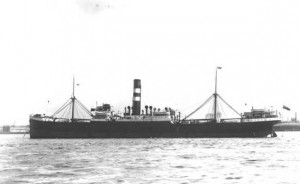The charming grounds of Shotteswell Vicarage were the scene of a very interesting gathering on Tuesday afternoon on the occasion of a fete and sale of work for parochial objects opened by Miss Loveday of Arlescote, whose family have long been associated with the Church-life of the district. The grounds had been made very attractive by a willing band of workers. Streamers of small flags spanned the carriage-way between the Church yard and the vicarage and the front lawn was tastefully arranged with stalls with a maypole in the centre, and daintily laid tea tables in the orchard below. The ladies assisting were Mrs Sproule, Mrs Dunn, Mrs Tompkins, Mrs T White, Mrs Pearson, Miss Reading, Mrs Stileman, Mrs Johnson, the Misses Keys-Wells, Miss James, Miss Tompkins, Miss Muriel Johnson, Miss Sproule and Miss Isabel Spencer, Miss G. James, Miss A. Spencer, Miss Gladys Spencer etc. Miss Loveday was accompanied by her sister, Miss E. Loveday, and amongst the leading people present, in addition to the ladies already mentioned were Lady Stonehouse, Mrs Holbech, Miss Holbech, Miss Newington, the Rev. R. P. and Mrs Willock, Mrs R. Reading, Mrs A. E. Knott, and parishioners generally, the attendance increasing as the day advanced.
The Vicar and Mrs Sproule gave a hearty welcome to the visitors and at the time of the opening ceremony Mr R Sansbury of Bridge Street, Banbury photographed the company.
The Vicar, in introducing Miss Loveday to the Company, said his task was a very pleasant one. He only wanted to say a very few words before calling upon Miss Loveday to open the sale of work and fete. He observed that Shotteswell was in a peculiar position, a statement which would be thoroughly appreciated by those who knew the working of the parish. They were so situated that they had no squire amongst them. He did not think anybody in the parish paid super-tax and the majority paid no income tax at all. Some of them were engaged filling up the third page claiming abatement. In that way they did not get much support in a large way. They were dependent upon what they could realise by voluntary effort and in special ways like the one in which they were engaged that day, and whereby they hoped their parish funds would be increased. Whilst they did not go exactly begging to their neighbours they asked them to come and lay out their money, for which they provided them with an equivalent for the same in the shape of articles upon the stalls. They had no desire to over-price articles and they hoped that visitors would be gratified with the return they got for their money. They hoped those who visited them would go away with full hands and empty purses, and by that means they hoped to raise for parochial objects sufficient to carry on the work of the parish. There was no need in Shotteswell to introduce Miss Loveday to the inhabitants. She was known far and wide by her kind deeds, and her family had been associated with those parts for generations. On reference to the Church Book he found that from 1840 to 1857 the Rev. W. C. Loveday was the curate in charge of that parish. In those days, Shotteswell had no resident Vicar. The village, he believed, was served by Warmington. Many of the older members of the parish had heard how Mr Loveday used to be going in and out amongst them, performing his daily work and administration amongst them. The Loveday family were known for their good deeds and kindly words, and they felt it was very kind of Miss Loveday to come and help them in the way she had that day coming to open the sale of work (applause).
Miss Loveday who was the recipient of a basket of beautiful roses, thanked Mr Sproule for his very kind words about herself and her family. She could just as a little child remember her uncle having sole charge of Shotteswell. He used to come over on a Sunday and during the week at a time when there was no resident Vicar. The only vicarage was a cottage with one room. Shotteswell had always had a special place in the thoughts and memories of her family. She thought some of the older parishioners might just remember her uncle. She had great pleasure in declaring the fete and sale of work open and in wishing it every success (applause).
Mr C. F. Stileman, one of the churchwardens, on behalf of the village thanked Miss Loveday for coming to help them in the way she had. It was only another occasion of her practical sympathy.
The Rev. R. P. Willock seconded the proposition, which was cordially carried and Miss Loveday having briefly replied, the company adjourned to the attractions of the fete.
The maypole dancing was very picturesque and well-performed by the Sunday School children under the direction of Miss Sproule, Miss Isabel Spencer playing the accompaniments. The tea was well patronised and the stalls seen shorn of their contents.
In the evening the Horley band attended, and there was a dance on the lawn to conclude the day’s gathering.
Banbury Guardian, July 1915
